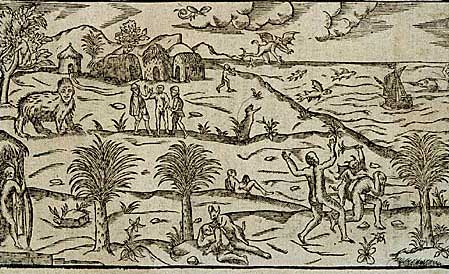The Beginnings of Anthropology
The historical event which unintentionally created cultural anthropology was the discovery, conquest and colonization of much of the world by Europe, an event which lasted from the late 15th through the first half of the 20th century. As a result of this event, at least a few Europeans began to have some idea of the diversity of the world's cultures. Prior to that most people knew a bit about their immediate neighbors, and had heard about the people on the other side of their neighbors, but long distance travelers were rare.
With the advent of explorers and conquerors from Spain, Portugal, England and other European countries, knowledge of various cultures began to accumulate. Much of it, even by actual eyewitnesses, was false. There were reports of people with tails, people with one eye in the middle of their forehead, people who put their elders in cages and sold them in the markets to be eaten. But some of the information brought back and recorded was accurate, and it began to challenge the world view of Europeans.

Eyewitness Drawing of Europeans and Native Americans, early 16th century. Note creature at left and in upper right corner.
I want you to put yourself in the shoes of Europeans of the 15th-18th centuries, and try to imagine their world, try to gain an emic perspective. It was a world dominated by absolute monarchs, where most people were poor illiterate peasants, where Christian (particularly Catholic) belief systems prevailed. It was also a world of rapid change which was increasingly flooded with new information which challenged the older belief systems. The Christian story of creation was the basis of everyone's world view, yet if interpreted literally, it was hard to explain so many different people and cultures as seemed to actually exist. The Spaniards were not even sure the Native Americans were people, and stopped their conquest of the "new world" for several years, while the question was put to the Pope: were these actual people with souls, or were they merely some non-human life form, not descended from Adam and Eve?
In an effort to make sense of things, three explanations or paradigms (not really theories in the scientific sense) were developed. One was the degenerative explanation, the second the noble savage view, and the third cultural evolutionism. The next two lessons will discuss these paradigms in slightly more detail; the table below lists the major traits of each view.
| Paradigm |
How Started |
What Happened |
Consequences |
Importance |
| Degenerative |
God created humans to live a civilized life, and follow Judaic/Christian Principles
|
However, in some places, humans willfully turned away from God; as a result, they degenerated into Savagery. |
Since Savages are Savage because of their own sins, civilized people need have no moral restrictions in dealing with them. |
An early form of blaming the victim; widely popular for centuries with genocidal consequences in many areas. |
| Noble Savage |
God created humans to live as noble savages, free and equal and without sin. |
However, in some places humans have degenerated into Civilization with its class systems, inequality, and widespread poverty. |
"Savage" or "Primitive" cultures are to be studied as examples of what civilized humans have lost, and should be preserved if at all possible. |
Identified with the artistic movement known as Romanticism, and with social reform in Europe. Continues to be a minor paradigm, particularly in the arts. |
| Cultural Evolutionism |
All humans began as foragers (hunters and gatherers) |
However, due to certain external stimuli, some societies progressed to Civilization. |
Since progress is inevitable, it is the duty of those living in Civilization to help those who are less progressive. |
Cultural Anthropology began with the attempt to prove the validity of cultural evolutionism. It became an increasingly popular view, and tends to be the major paradigm of many Americans. |
|